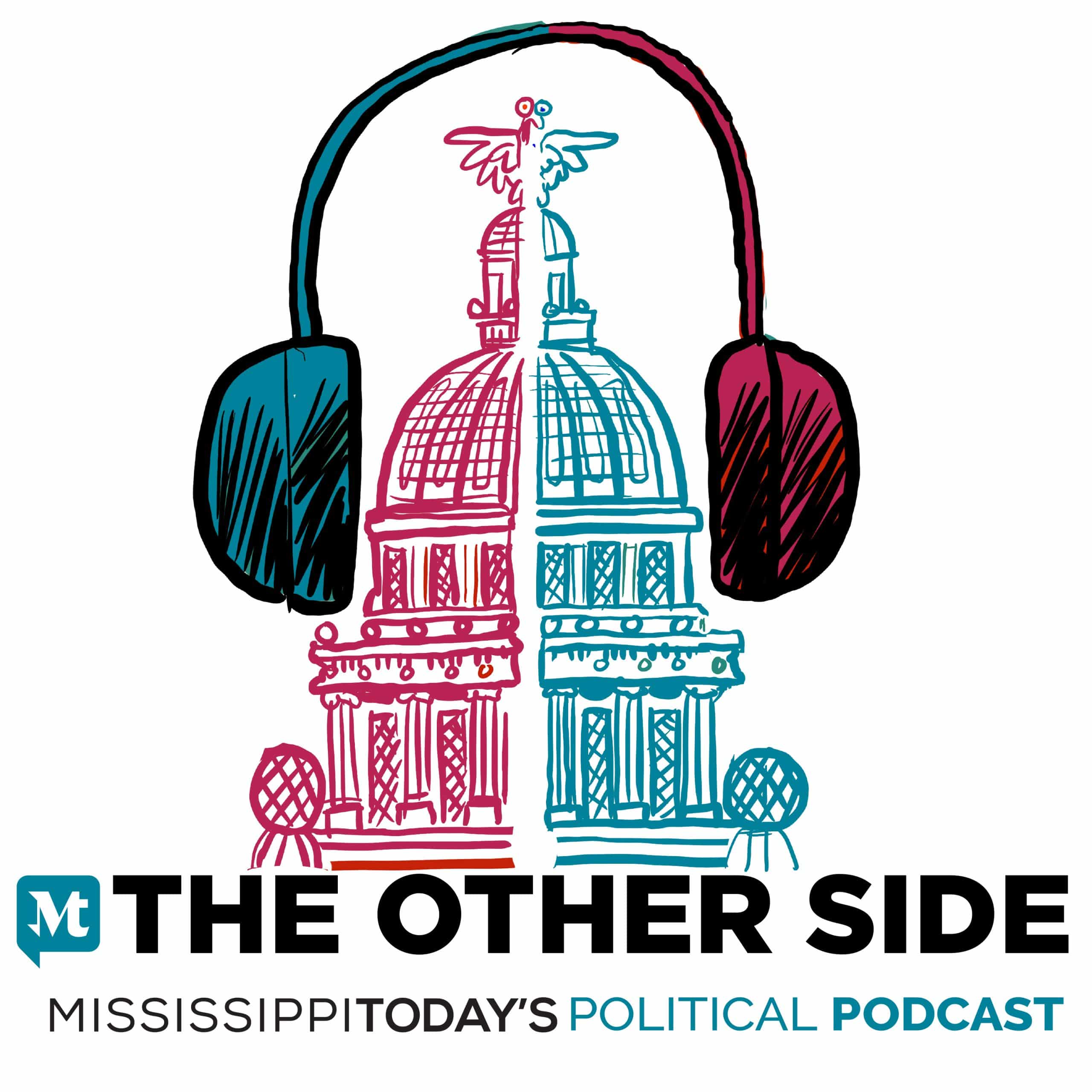Mississippi Today
‘A matter of life and death:’ Hundreds rally at Capitol for full Medicaid expansion
Charles and Cheryl Penson shuffled up the steps of a bus in Tupelo at 4 a.m. on Tuesday to begin a long day's trek to the state Capitol
The reason the Pensons, both of whom are ministers, traveled over three hours to the seat of Mississippi's government is they know several people in rural northeast Mississippi, including one of their own daughters, who could benefit from expanded Medicaid coverage.
Their daughter is a businesswoman and a single mother, they said, who works hard at her job, but she could use assistance with health care costs, especially to help her young child who has experienced health issues recently.
“I am here because I want to see what is morally right done for the people of Mississippi,” Cheryl Penson said as her husband nodded in agreement. “If you have a heart, you have to have a heart for all people.”
The husband and wife weren't alone.
The two joined hundreds of doctors, clergy and other Mississippians from over 35 communities across the Magnolia State who shared stories of their own at a “Full Expansion Day” rally at the Capitol. They urged legislators to expand Medicaid coverage under the federal Affordable Care Act.
Christine Dunaway of Jackson told Mississippi Today she attended the rally because she spent 20 years as an advocate for people living with disabilities as the former director of Living Independence for Everyone of Mississippi.
“I worked with so many people over the years who would have benefited from Medicaid expansion — working poor people trying to go to work, who didn't have insurance, couldn't afford it, didn't have access to it,” Dunaway said. ” … I was born missing three limbs. My parents would have been considered middle class, but they couldn't afford prosthetics back then.”
As personal stories meshed with religious sermons the concrete steps on the front of the Capitol became like church pews when faith leaders from different religions and Christian denominations pleaded with legislators to give poor Mississippians access to health insurance.
“As a state that is proud of its pro-life stance, it is only fitting that this Legislature now leans into the opportunity to make it possible for all Mississippians across this state to have full access to health care,” said the Rev. Reginald Buckley, pastor of Jackson's Cade Chapel M.B. Church.
But just hours earlier, some of those same ministers and participants appeared to take James' epistle of “faith without works is dead” to heart by beginning their day of advocacy in actual pews at the historic sanctuary of Mt. Helm Baptist Church in downtown Jackson.
The morning service in one of the oldest Black churches in Jackson started with songs, prayers, scripture centered on civilly pressuring the 174 state lawmakers in Jackson to pass expansion.
“We thank you for collective power, but surely Lord we know that apart from your power, we can do nothing,” the Rev. Dr. C.J. Rhodes, the pastor of the church, prayed. “For it's not by power nor by might, but by your spirit, says the Lord of hosts. So breathe upon us, give us your spirit, oh God, and give us your blessings so that we can do what seems to be impossible even today.”
The prayers of accomplishing the insurmountable, though, quickly turned into advocacy chants, the new sanctuary became the 2nd floor rotunda of the Capitol and the hymns morphed into telephone calls that flooded the voicemails of holdout legislators.
After the morning of worship, the interdenominational group assembled signs, slapped supportive stickers on their shirts, reviewed phone-banking scripts and tweaked message to their local legislators over expansion.
“Jesus is the reason that I'm here,” said Brittany Caldwell, a coordinator of community engagement for Great Rivers Fellowship and Natchez resident, said. “To be a disciple of Jesus is to be a disciple in both word and action.”
The rally comes in the middle of House and Senate leaders attempting to negotiate a compromise on Medicaid expansion legislation after the two chambers passed drastically different plans earlier in the session.
The House's expansion plan aims to expand health care coverage to upwards of 200,000 Mississippians, and accept $1 billion a year in federal money to cover it, as most other states have done.
The Senate, on the other hand, wants a more restrictive program, to expand Medicaid to cover around 40,000 people, turn down the federal money, and require proof that recipients are working at least 30 hours a week.

Those at the rally made clear they support “Full expansion now,” which they frequently chanted, and not the Senate proposal, which its drafters have referred to as “expansion lite.”
Representatives of the two chambers, called conferees, have not yet met in public to haggle over a final expansion plan, and as of Tuesday evening, the Legislature's website did not list a scheduled meeting to take place later this week.
A natural compromise is for the two chambers to agree on a “MarketPlus Hybrid Plan,” which health policy experts with the Center for Mississippi Health Policy and the Hilltop Institute at the University of Maryland, Baltimore County estimate could save the state money in the long-term.
The hybrid plan would offer expanded Medicaid coverage through the state's managed care program for those making under 100% of the federal poverty level. For those making 100% to 138% (up to $20,000 for an individual) of poverty level, the plan would use federal money to provide assistance for them to buy private insurance plans through Mississippi's marketplace exchange.
Republican Gov. Tate Reeves has privately vowed to lawmakers that he will veto any Medicaid expansion bill that reaches his desk, putting the future of expansion in the hands of the Legislature, who can override the veto with a two-thirds vote in both chambers.
House Speaker Jason White, a Republican from West, previously told Mississippi Today in an interview that he believes he can hold a bipartisan group of more than 90 House members, a veto-proof majority, together in support of a compromise expansion package.
But the coalition of support in the 52-member Senate is more fragile. The Capitol's upper chamber only passed its austere expansion plan by 36 votes, one vote shy of the two-thirds threshold needed to override a governor's veto.
One reason the expansion debate has caused some Republican senators to oppose the proposal is it's become mired in partisan politics because of the governor's messaging and hardline conservatives derisively labeling it “Obamacare expansion.”
But clergy at the Capitol on Tuesday said the issue rises above partisan politics.
The Rev. Dr. Jeff Parker, senior pastor at Southside Baptist Church in Jackson, is a self-described “Southern Baptist Republican,” who believes in the Gospel of Matthew, where it says “whatever you did for one of the least of these brothers and sisters of mine, you did for me” should move Christians to support expansion.
Parker recounted a conversation he had with a friend shortly before the rally who warned him he would be branded as a liberal if he spoke too forcefully in favor of the Medicaid expansion.
“I looked at him, and I finally said this: ‘Are we reading the same Bible?'” Parker said. “I would challenge every church in the state of Mississippi, regardless of your denominational tag, to take a long, hard look at the book of Matthew.”
Mississippi Today reporters Bobby Harrision and Geoff Pender contributed to this report.

This article first appeared on Mississippi Today and is republished here under a Creative Commons license.
Mississippi Today
On Confederate Memorial Day, an honest annotation of the Mississippi Declaration of Secession
Today, Mississippi officially recognizes Confederate Memorial Day as the anchor of Gov. Tate Reeves-proclaimed Confederate Heritage Month.
Mississippi is one of just four states to still officially recognize the state holiday, which has been granted under gubernatorial proclamations from the past five governors. Notably, one cannot find Reeves' proclamation on his social media accounts; instead, you'd have to venture over to the Facebook page of Confederate States president Jefferson Davis' home if you want to read it, as first reported by the Mississippi Free Press.
The actual language of the Confederate Heritage Month proclamation appears benign at first glance. It opens with a reference to the start of the American Civil War in 1861 and follows with an acknowledgment of Confederate Memorial Day in Mississippi (more on that to come).
But the final paragraph, when examined with a critical eye, offers a reason for pause and concern. It reads:
“WHEREAS, as we honor all who lost their lives in this war, it is important for all Americans to reflect upon our nation's past, to gain insight from our mistakes and successes, and to come to a full understanding that the lessons learned yesterday and today will carry us through tomorrow if we carefully and earnestly strive to understand and appreciate our heritage and our opportunities which lie before us.”
Gov. Tate Reeves' 2024 Confederate Heritage Month Proclamation
The “if” in that passage is doing a lot of work. We can only learn from the past IF we embrace “our heritage?” That line then begs the question, “Whose heritage, exactly?”
The answer is obvious and makes an earnest reflection of the sins of the Civil War necessary. Despite the lofty verbiage of “insight” and “lessons”, the proclamation is a prop upon which the “heritage” of the Confederacy is elevated — a heritage defined by the institution of slavery.
This Confederate Memorial Day provides us an opportunity to take a deep dive into that heritage by carefully dissecting the document that most clearly outlines and defends it.
LISTEN: A Reading of the Mississippi Declaration of Secession
The Declaration of Secession was the result of a convention of the Mississippi Legislature in January of 1861. The convention adopted a formal Ordinance of Secession written by former Congressman Lucius Quintus Cincinnatus Lamar. While the ordinance served an official purpose, the declaration laid out the grievances Mississippi's ruling class held against the federal government under the leadership of President-elect Abraham Lincoln.
Below are a few annotated excerpts from the Mississippi Declaration of Secession.

The convention really couldn't be any more straightforward with the title and opening graf of their declaration. There is little to no ambiguity about the intent of this document, which is to say, “we are seceeding and this is why.”
If there is any doubt, simply toss the title into the thesaurus machine and see what you get…
“An Assertion of the Direct Causes Which Create and Excuse the Secession of the State of Mississippi from the Federal Union“
Don't think there is much mystery there.
And there it is.
Despite the “states' rights” rhetoric of the Lost Cause myth, the convention makes it undoubtedly evident that slavery is the prominent reason for secession (just like they promised to do in the previous passage).
It offers a clear and concise answer to the question, “States' rights to do what?”
Read that passage again in your best Ron Burgundy voice. “It's science.”
But in all seriousness, one can't escape the blinding racism of this passage. Nor should one ignore how damaging the perpetuity of this unscientific, unrealistic understanding of the Black race and the Black body has been in the century-and-a-half since.
These lines are in reference to the federal government's attempts to block the expansion of slavery into new territories as the United States grew.
The Ordinance of 1787 prohibited slavery in the Northwest Territory. The Missouri Compromise of 1820 prohibited slavery in territories formed from the Louisiana Purchase north of the 36°30′ parallel.
The convention doubles down on the notion that secession is not only needed to preserve the institution of slavery, but quelch any attempts to deny its existence in emerging territories
Throughout much of the convention's list of grievances, the word “it” is used as a place-holder for the “hostility to this institution” that is mentioned in the previous excerpt. Or, to put it another way, “it” is the abolitionist movement.
Again, the racism is unavoidably clear. To the convention, advocacy for social and political equality for Black Americans is akin to promoting insurrection.
What comes after is a line that probably looks all too familiar to anyone who follows the ebbs and flows of grievance politics. The convention paints the press and schools as enlisted agents against them and their cause – the echoes of which are still heard today in regards to policies directed at systemic racism or the preservation of rights for the LGBTQ+ community. It's not a new addition to the playbook, and politicians who invoke this language are merely channeling their secessionist forefathers.
You have to appreciate the tone deaf irony of this bit. It's not the 435,000-plus enslaved Mississippians who are subject to degradation, but rather the wealthy, white ruling class.
This line also helps dispel the myth of the “compassionate slaveowner,” as it clearly indicates how slave-owning Mississippians viewed the enslaved — as a calculated asset in their ledgers, as a dollar figure, as potential lost property.
To top it off, the convention elevates its cause — the preservation of slavery — to a higher status than the causes for the American Revolution.
There is one thing the Declaration of Secession makes abundantly clear: slavery — the preservation and expansion of — is the prominent reason Mississippi and 10 other states seceded to form the Confederacy.
Reeves could very easily end the practice of recognizing April as Confederate Heritage Month. It's only made possible through a proclamation of the governor. All he has to do is say “no.”
But even if Reeves remains stubborn, the legislative branch wields enormous power, too. Mississippi's state holidays are codified, and lawmakers have the power to divorce Mississippi from a century-old practice of honoring Confederates and their cause. They can pass legislation ending Confederate Memorial Day on the last Monday in April. They can sever Robert E. Lee from the annual celebration of Martin Luther King Jr. on the third Monday of January. And they can let Memorial Day exist on its own as a federal holiday without doubly venerating Jefferson Davis on the same day.
For those keeping score, that's three Confederate-themed state holidays in Mississippi.
These holidays are rooted in the Jim Crow era. They stand side-by-side with laws and policies meant to deprive Black Mississippians of their economic and civic vitality. Reeves and lawmakers could choose to start down a path of rectification — remedying some of the ills of policies designed to keep certain Mississippians disenfranchised and destitute.
But for now, the holidays — and the reasons for them — remain. Slavery and the subjugation of Black people is the bedrock of Confederate “heritage.”
The origins of Confederate Memorial Day in Mississippi trace back to 1906, a time of Southern Redemption and the reemergence of the Ku Klux Klan.
Ignorance cannot and should no longer be an excuse — certainly not in 2024.
This article first appeared on Mississippi Today and is republished here under a Creative Commons license.
Mississippi Today
On this day in 1945


April 29, 1945

The memoir by Richard Wright about his upbringing in Roxie, Mississippi, “Black Boy,” became the top-selling book in the U.S.
Wrighyt described Roxie as “swarming with rats, cats, dogs, fortune tellers, cripples, blind men, whores, salesmen, rent collectors, and children.”
In his home, he looked to his mother: “My mother's suffering grew into a symbol in my mind, gathering to itself all the poverty, the ignorance, the helplessness; the painful, baffling, hunger-ridden days and hours; the restless moving, the futile seeking, the uncertainty, the fear, the dread; the meaningless pain and the endless suffering. Her life set the emotional tone of my life.”
When he was alone, he wrote, “I would hurl words into this darkness and wait for an echo, and if an echo sounded, no matter how faintly, I would send other words to tell, to march, to fight, to create a sense of the hunger for life that gnaws in us all.”
Reading became his refuge.
“Whenever my environment had failed to support or nourish me, I had clutched at books,” he wrote. “Reading was like a drug, a dope. The novels created moods in which I lived for days.”
In the end, he discovered that “if you possess enough courage to speak out what you are, you will find you are not alone.” He was the first Black author to see his work sold through the Book-of-a-Month Club.
Wright's novel, “Native Son,” told the story of Bigger Thomas, a 20-year-old Black man whose bleak life leads him to kill. Through the book, he sought to expose the racism he saw: “I was guided by but one criterion: to tell the truth as I saw it and felt it. I swore to myself that if I ever wrote another book, no one would weep over it; that it would be so hard and deep that they would have to face it without the consolation of tears.”
The novel, which sold more than 250,000 copies in its first three weeks, was turned into a play on Broadway, directed by Orson Welles. He became friends with other writers, including Ralph Ellison in Harlem and Jean-Paul Sartre and Albert Camus in Paris. His works played a role in changing white Americans' views on race.
This article first appeared on Mississippi Today and is republished here under a Creative Commons license.
Mississippi Today
Podcast: The contentious final days of the 2024 legislative session

Mississippi Today's Adam Ganucheau, Bobby Harrison and Geoff Pender break down the final negotiations of the 2024 legislative session's three major issues: Medicaid expansion, education funding, and retirement system reform.
This article first appeared on Mississippi Today and is republished here under a Creative Commons license.
Did you miss our previous article…
https://www.biloxinewsevents.com/?p=353661
-
Local News4 days ago
Sister of Mississippi man who died after police pulled him from car rejects lawsuit settlement
-
Mississippi Today4 days ago
At Lake High School in Scott County, the Un-Team will never be forgotten
-
Mississippi Today1 day ago
On this day in 1951
-
Mississippi News2 days ago
One injured in Mississippi officer-involved shooting after chase
-
Mississippi News7 days ago
Cicadas expected to takeover north Mississippi counties soon
-
Mississippi News6 days ago
Viewers make allegations against Hatley teacher, school district releases statement – Home – WCBI TV
-
Mississippi News Video5 days ago
Vehicle struck and killed man lying in the road, Alcorn County sheriff says
-
Mississippi News4 days ago
Ridgeland man sentenced for molesting girl



































